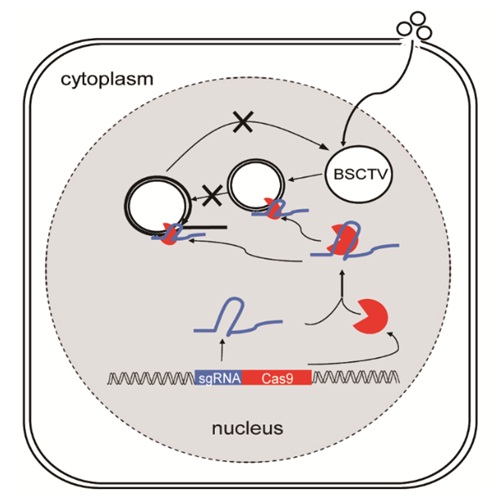Geminiviruses are circular single-stranded DNA (ssDNA) viruses that replicate within the nuclei of plant cells, causing serious damage to many dicotyledonous crop plants, including tomato, cassava, cotton, sugar beet and pepper. During geminivirus replication, the ssDNA is converted to a double-stranded DNA (dsDNA) intermediate, from which new ssDNA is generated by rolling-circle replication.
Researchers at GAO Caixia’s group from the Institute of Genetics and Developmental Biology, the Chinese Academy of Sciences, reported introducing the CRISPR-Cas9 genome editing system protected plants from geminiviruses infection. They demonstrated that a CRISPR-Cas-like immune system directed against a geminiviruse can be established in plants and this system could also be used in other host plants to confer resistance to other DNA viruses.
Researchers in GAO’s lab focused on Beet severe curly top virus (BSCTV) and its hosts Arabidopsis thaliana and Nicotiana benthamiana. They designed sgRNA specifically targeting to BSCTV genome. In transgenic plants, the expression of Cas9/sgRNA significantly reduced the accumulation of BSCTV by destructing the virus genome, and the anti-viral efficiency was correlated with the expression level of Cas9. They also came to conclusion that sgRNA targets might be chosen in any part of the viral genome. This work provides a new strategy to develop anti-viral crop plants.
Contact:
Dr. GAO Caixia
Institute of Genetics and Developmental Biology, Chinese Academy of Sciences
Figure. The overview of sgRNA-Cas9-based sequence-specific system for conferring geminivirus resistance in plants. (Image by IGDB)
 Figure. The overview of sgRNA-Cas9-based sequence-specific system for conferring geminivirus resistance in plants. (Image by IGDB)
Figure. The overview of sgRNA-Cas9-based sequence-specific system for conferring geminivirus resistance in plants. (Image by IGDB) CAS
CAS
 中文
中文




.png)
